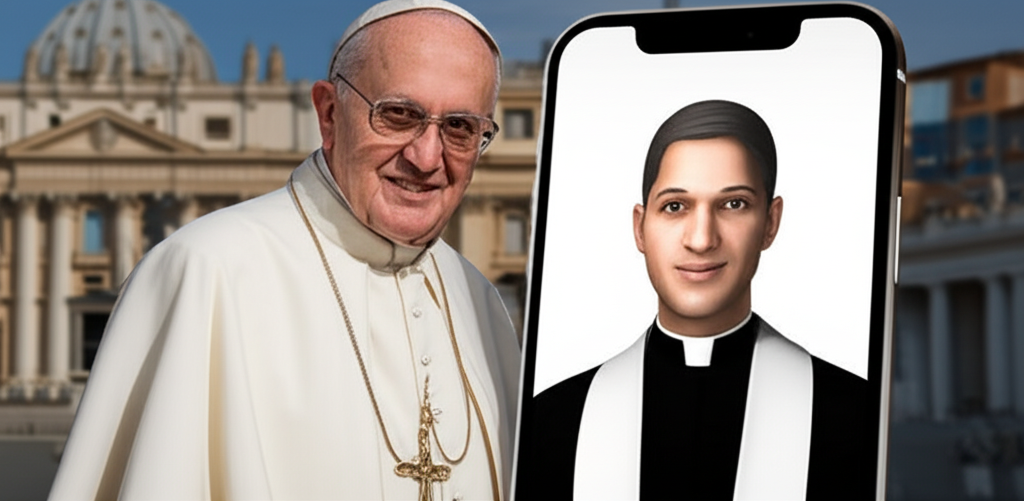In an unprecedented move that has sent shockwaves through the Catholic world, Pope Leo XIV announced the Vatican's development of an artificial intelligence-powered priest designed to hear confessions through a smartphone application called "Divine Mercy Digital."
The AI priest, dubbed "Father Algorithm" by Vatican technicians, has been trained on centuries of Catholic theological texts, canon law, and confession protocols. His Holiness described the project as "meeting the faithful where they are in the digital age."
Speaking at a packed press conference in the Apostolic Palace, Pope Leo XIV defended the controversial initiative. "The sacrament of reconciliation is fundamental to our faith, yet we see declining participation, particularly among young Catholics," the Pope explained.
"If technology can bring souls closer to God's mercy, then we must embrace it as a tool of evangelization."
The "Divine Mercy Digital" app, developed in partnership with a Silicon Valley tech firm, features an AI confessor trained on the writings of saints, papal encyclicals, and thousands of hours of recorded confessions from volunteer priests. The system can provide personalized penance, spiritual guidance, and even detect patterns of sin that might require human intervention.
Cardinal Alessandro Torretti, Prefect of the Congregation for Divine Worship, expressed cautious optimism about the project. "Father Algorithm has demonstrated remarkable theological sophistication in beta testing," he noted. "The AI can quote Scripture contextually, assign appropriate penances, and even offer comfort to the penitent in multiple languages."
However, the announcement has sparked fierce debate within Catholic circles. Traditional Catholics have denounced the initiative as "sacrilegious" and "a mockery of the sacraments." Father Michael O'Brien, a prominent conservative theologian, argued that "the sacrament of confession requires the real presence of a priest acting in persona Christi. No algorithm, however sophisticated, can replace the human soul and divine grace."
The Vatican's tech team, led by newly appointed Chief Digital Officer Sister Maria Gonzalez, insists that rigorous safeguards are in place. "Father Algorithm operates under strict theological parameters," she explained. "For serious sins or complex spiritual matters, the system automatically refers users to human priests. We're not replacing confession – we're expanding access to it."
Early beta testing among young Catholics in Rome has yielded mixed results. Marco Benedetti, a 22-year-old university student, praised the app's convenience. "I can confess during my lunch break without worrying about judgment or long lines," he said. "Father Algorithm is actually quite compassionate."
But Maria Rossi, a 45-year-old mother of three, remained skeptical. "There's something deeply unsettling about confessing to a machine," she admitted. "Part of confession is the human connection, the wisdom that comes from a priest's life experience."
The app includes several innovative features, including a "Examination of Conscience" guide powered by machine learning, which adapts questions based on the user's age, profession, and previous confessions. It also offers a "Spiritual Progress Tracker" that monitors patterns in confession frequency and types of sins reported.
Privacy concerns have also emerged, with cybersecurity experts questioning how confession data will be stored and protected. The Vatican has assured users that all confessions are encrypted and automatically deleted after 24 hours, with no data retained on Vatican servers.
Pope Leo XIV acknowledged the controversy but remained firm in his conviction. "Christ himself used the tools of his time – parables, fishing boats, even tax collectors – to spread the Gospel," he said. "Today's tools are smartphones and artificial intelligence. We must sanctify these technologies for God's glory."
The "Divine Mercy Digital" app is expected to launch globally on Easter Sunday, with versions available in 12 languages. The Vatican plans to monitor its usage closely and gather feedback from bishops worldwide before considering expansion to other sacraments.
As the Catholic Church grapples with declining attendance and an aging priesthood, Pope Leo XIV's embrace of artificial intelligence represents either a bold step into the future or a dangerous departure from tradition – depending on one's perspective. What remains certain is that "Father Algorithm" will be closely watched by Catholics and technologists alike as this unprecedented experiment in digital spirituality unfolds.
